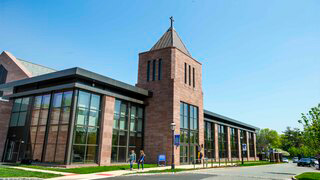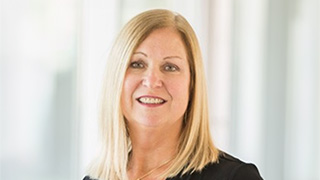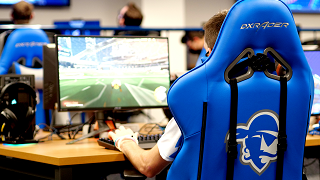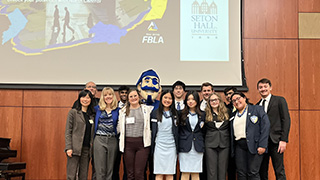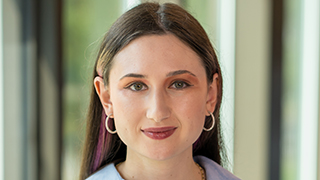Dean Emerita and Fulbright Scholar Explores How to Teach Emerging Leaders With Emmy Award-Winning Broadcaster
Wednesday, November 20, 2024
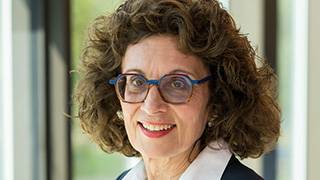
Karen Boroff, Ph.D.
Karen Boroff, Ph.D., professor of management and dean emerita, Stillman School of Business, discussed the leadership skills necessary for today’s emerging leadership to succeed with Steve Adubato, author, speaker, and Emmy Award-winning broadcaster of Lessons in Leadership, along with co-host Mary Gamba. This special edition explored Boroff’s 35-year legacy at Seton Hall University, collaborations with the United States Military Academy (USMA) at West Point and her Fulbright Scholar Award. The episode can be viewed here.
Boroff will wield her expertise in management, human resources, labor relations and negotiations for her Fulbright project, "Leadership, Creativity, Collaborations: Transforming Concepts into Practice," at Universidad Politécnica de Madrid (UPM), in Madrid, Spain in Spring 2025.
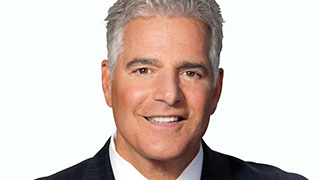
Steve Adubato, Ph.D.
Adubato, Gamba and Boroff reflected on the significance of the Fulbright Award. The project will focus on equipping leaders with competencies in change management, as all higher education institutions seek to navigate the ever-changing landscape of academe.
“Well, in this day and age, everyone is looking to collaborate, and collaborating doesn't stop at the Atlantic or the Pacific Ocean. You want to form new connections and more relationships. You want to be internationally savvy for yourself and your students. So, this opportunity at the Universidad Politécnica de Madrid will foster all those kinds of collaborations and more, ultimately for the betterment of our students,” Boroff explained.
Seton Hall University, by virtue of the sabbatical program it extends to faculty, afforded Boroff the opportunity to reach out over two sabbaticals, which led to a prospering relationship with the University and the United States Military Academy at West Point.
Boroff taught departmental courses in human resource management and leading change, authored award-winning research papers, and mentored faculty and cadets for personal and professional excellence. This fostered a collaboration between students and faculty at both Seton Hall and the United States Military Academy, enhancing the University’s academic distinction and commitment to advance our academic rigor, strategically invest in instruction and research, and expand the vistas of leadership development for civilian and cadet students alike.
Boroff and Adubato recalled Adubato’s own memorable experience when he accompanied Boroff to the Academy for a day of teaching leadership and communication skills.
Boroff noted, “You were phenomenal, Steve. You really connected with the students at a very interpersonal level,” adding of her own experience, “To be able to teach the students who will be officers who will be in charge of the lives of Americans treasures, soldiers of tomorrow, is an honor beyond belief. So over time, we’ve continued to work with West Point nurturing at every turn. It’s hard for me to imagine that in 2010 with this journey beginning, [how] this relationship has been fostered immensely with faculty, staff, with collaborations on authorships, with West Point cadets coming to Seton Hall, with Seton Hall going up to West Point as students. It is so great.”
Adubato, Gamba and Boroff discussed how to engage the learners of today.
Boroff explained, “You have to engage today’s learners in all their senses – seeing, hearing, feeling, and more. Part of that engagement is to give our very best counseling to everyone that we possibly can. Feedback —positive or negative. Give it straight. Give it frankly and earnestly. Then you have done the job in giving your very best counseling. And hopefully the listener, the receiver, will say, ‘Okay, this makes sense, and this will make me better.’ I will be helped. In truth, among athletes, coaches and team members give feedback all the time. They will readily tell others, ‘you didn’t plant your foot here, or you should have angled your shot this way and not that way. We do this easily in athletic coaching. But, when someone has a miscue at work, leaders and fellow team members shy away. An effective leader will give the very best counsel he or she can give to everybody to make that team great.”
The interview concluded with a discussion of the latest research put forth by Boroff and her colleagues, Ruchin Kansal and Anthony Caputo in an opinion piece, Trust in leaders: Should we judge politicians the same way we judge business leaders?, published in ROI-NJ.
“The research shows that trust is a three-legged stool. Does the leader have the ability to do the job? Does the person act with integrity and will they act benevolently? The decisions that person makes, is it for the betterment of the organization,” Boroff explained, adding “We have looked at the trust for Gen Z, but given that we’re in the election season, we wondered whether this trust model applies to political leaders ... Do we measure their level of trust with ability, integrity, and benevolence? And we ask the readers to say whether that stool still holds or are there other factors that make us trust political leaders? Or do we just say, who can you trust regardless of the party?”
To learn more about how Seton Hall educates today’s emerging leaders, please visit Steve Adubato’s Lessons in Leadership with Karen Boroff.
To read the ROI-NJ opinion piece, please visit Trust in leadership: Should we judge politicians the same way we judge business leaders?
Categories: Business

